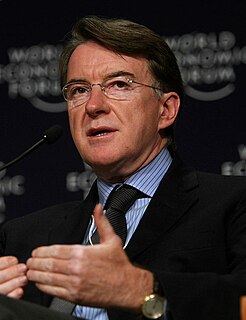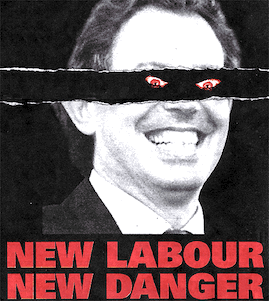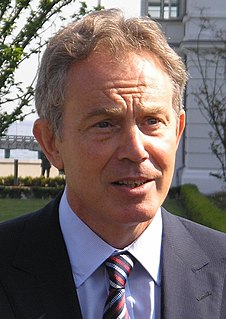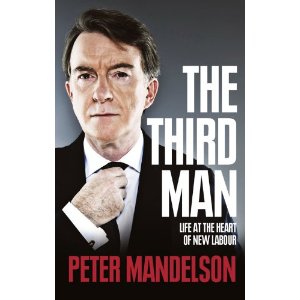 W
WNew Labour is a period in the history of the British Labour Party from the mid to late 1990s until 2010 under the leadership of Tony Blair and Gordon Brown. The name dates from a conference slogan first used by the party in 1994, later seen in a draft manifesto which was published in 1996 and titled New Labour, New Life for Britain. It was presented as the brand of a newly reformed party that had altered Clause IV and endorsed market economics. The branding was extensively used while the party was in government between 1997 and 2010. New Labour was influenced by the political thinking of Anthony Crosland and the leadership of Blair and Brown as well as Peter Mandelson and Alastair Campbell's media campaigning. The political philosophy of New Labour was influenced by the party's development of Anthony Giddens' Third Way which attempted to provide a synthesis between capitalism and socialism. Mark Bevir argues that another motivation for the creation of New Labour was as a response to the emergence of the New Right in the preceding decades. The party emphasised the importance of social justice, rather than equality, emphasising the need for equality of opportunity and believed in the use of markets to deliver economic efficiency and social justice.
 W
WThe Blair–Brown deal was a gentlemen's agreement struck between the British Labour Party politicians Tony Blair and Gordon Brown in 1994, while they were Shadow Home Secretary and Shadow Chancellor of the Exchequer respectively.
 W
WIn British politics, Blairism is the political ideology of the former leader of the Labour Party and Prime Minister Tony Blair and those that follow him. It entered the New Penguin English Dictionary in 2000. Proponents of Blairism are referred to as Blairites.
 W
WGordon Brown formed the Brown ministry after being invited by Queen Elizabeth II to form a new administration following the resignation of the previous Prime Minister of the United Kingdom, Tony Blair, on 27 June 2007. Brown formed his government over the course of the next day, with Jacqui Smith being appointed the United Kingdom's first female Home Secretary.
 W
WThe first Blair ministry lasted from May 1997 to June 2001. After eighteen years in opposition, Labour ousted the Conservatives at the May 1997 election with a 179-seat majority. The Prime Minister, Tony Blair, who turned 44 years old days after leading Labour to victory, was the youngest Prime Minister of the twentieth century.
 W
WA Journey is a memoir by Tony Blair of his tenure as Prime Minister of the United Kingdom. Published in the UK on 1 September 2010, it covers events from when he became leader of the Labour Party in 1994 and transformed it into "New Labour", holding power for a party record three successive terms, to his resignation and replacement as prime minister by his Chancellor of the Exchequer, Gordon Brown. Blair donated his £4.6-million advance, and all subsequent royalties, to the British Armed Forces charity the Royal British Legion. It became the fastest-selling autobiography of all time at the bookstore chain Waterstones. Promotional events were marked by anti-war protests.
 W
WPeter Benjamin Mandelson, Baron Mandelson is a British Labour politician who served as First Secretary of State from 2009 to 2010. A member of the Labour Party, he was President of the Board of Trade in 1998 and from 2008 to 2010. He is the president of international think tank Policy Network, honorary president of the Great Britain–China Centre, and chairman of strategic advisory firm Global Counsel. Mandelson is often referred to as a Blairite.
 W
WNew Labour, New Danger was an advertising campaign run in the United Kingdom by the Conservative Party during the run up to the 1997 General Election. It was created by advertising agency M&C Saatchi, and refers to the Labour Party's "New Labour" slogan.
 W
WJonathan Portes is Professor of Economics and Public Policy at the School of Politics & Economics of King's College, London and a senior fellow at the UK in a Changing Europe.
 W
WThe premiership of Gordon Brown began on 27 June 2007 when Brown accepted the Queen's invitation to form a new administration, replacing Tony Blair as the Prime Minister of the United Kingdom, and ended on 11 May 2010. While serving as Prime Minister, Brown also served as the First Lord of the Treasury, the Minister for the Civil Service and the Leader of the Labour Party. His Premiership ended following the Labour Party's defeat at the 2010 general election by the Conservative party, led by David Cameron, and subsequent failure to form a coalition government
 W
WThe premiership of Tony Blair began on 2 May 1997, when Blair accepted an invitation of Queen Elizabeth II to form a government following the Labour party's landslide victory in the 1997 general election, and ended on 27 June 2007 upon his resignation. Whilst serving as Prime Minister of the United Kingdom, Tony Blair concurrently served as the First Lord of the Treasury, the Minister for the Civil Service, the Leader of the Labour Party and the Member of Parliament for Sedgefield. He remains a Privy Counsellor, having first been appointed in July 1994 when he became Leader of the Opposition. Blair is the Labour Party's longest-serving Prime Minister, the only Labour Prime Minister to have led the party to victory since 1974, and—having led the party to three consecutive general election victories—also the only Labour Prime Minister to serve two full consecutive terms. Blair is both credited with and criticised for moving the Labour Party closer to the centre of British politics, using the term "New Labour" to distinguish his pro-market policies from the more socialist policies which the party had espoused in the past. His premiership ended upon his resignation in 2007.
 W
WThe Purple Book: A Progressive Future For Labour is a 2011 collection of essays by politicians in the UK's Labour Party, many of whom are considered to belong to the Blairite wing of the party. The book was conceived and promoted by Progress. It has been compared to The Orange Book: Reclaiming Liberalism, published seven years earlier by then-leading members of the UK's Liberal Democrats.
 W
WThe second Blair ministry lasted from June 2001 to May 2005. Following the financial crisis in Japan at the end of the 1990s, there was a brief recession in other parts of the developed world including Germany, Italy and France in the early-2000s, but the UK avoided recession and continued to maintain a strong economy and low unemployment.
 W
WThe third Blair ministry lasted from May 2005 to June 2007. The election on 5 May 2005 saw Labour win a historic third successive term in power, though their majority now stood at 66 seats – compared to 167 four years earlier – and they failed to gain any new seats. Blair had already declared that the new term in parliament would be his last.
 W
WThe Third Man: Life at the Heart of New Labour, published in July 2010, is the memoir of Peter Mandelson, former senior government minister and confidant in the New Labour governments of both Tony Blair (1997–2007) and Gordon Brown (2007–2010).
 W
W"Tony's Cronies" is a term in British politics and media given to people who were viewed as being given positions of power because of their personal friendships with Prime Minister Tony Blair, during his premiership between 1997 and 2007. These included those granted life peerages and public positions based on their friendship with Blair rather than their individual merits. The phrase was created by the Conservative Party after the 1997 United Kingdom general election and was continually used in the media throughout Blair's premiership.